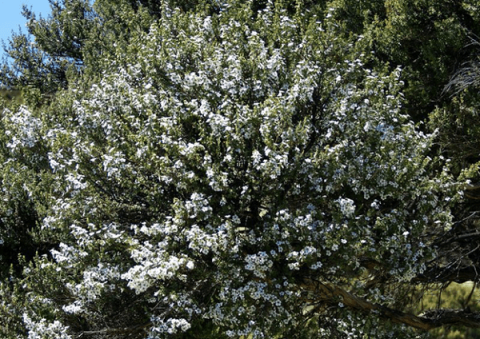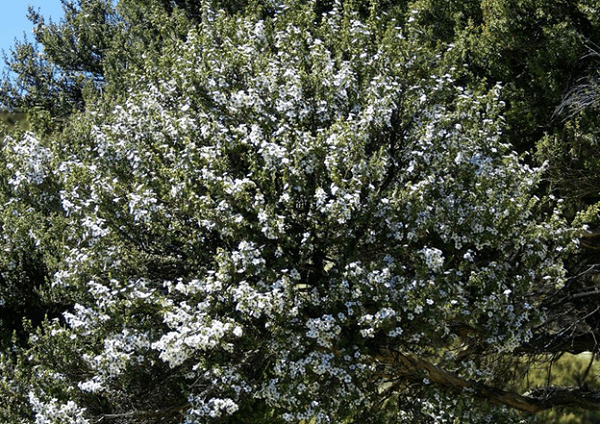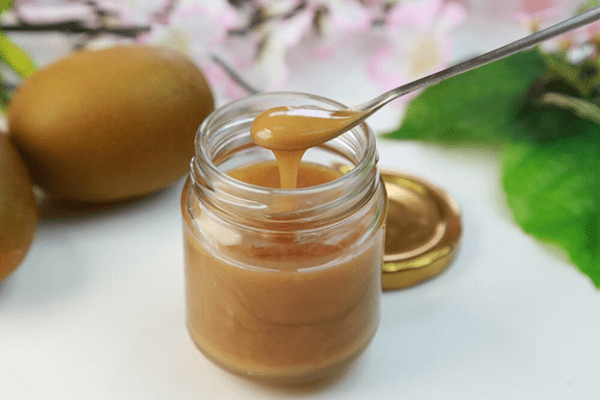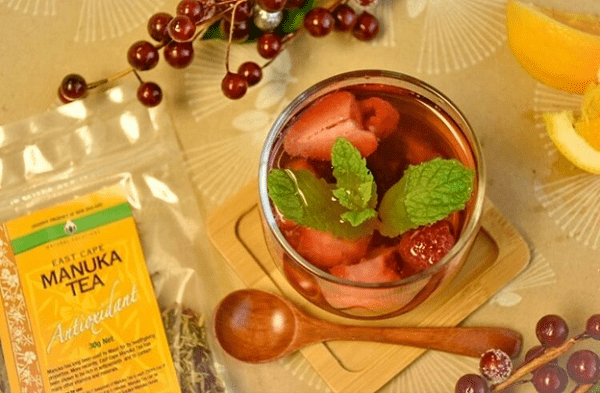Health and beauty benefits of manuka

Manuka honey is obtained from the nectar of the Manuka flower. They are very well known for their valuable health properties that go beyond other common forms of honey. So what other benefits do the remaining parts bring to humans? Let's learn more about the uses of Manuka tree with SignsSymptomsList through the article below!
content
- 1. General introduction
- 2. Health benefits of parts of the manuka plant
- 3. How to use Manuka
- 4. Note when using
1. General introduction
Manuka is a tea plant native to New Zealand. They are also known as New Zealand tea trees because the first indigenous people here used the bark to make tea. Manuka is an evergreen shrub that has pointed leaves and usually grows up to two meters tall.
They have small, white or sometimes pink flowers that bloom in spring and summer. Manuka can also grow in dry and humid places. In fact, when the plant is fully grown, it can withstand prolonged drought and frost.
Manuka's healing powers are known for the main antibacterial ingredient found in the nectar. Therefore Manuka honey is very famous all over the world. It's not just humans who are aware of the miraculous uses of this plant – even macaws use it to get rid of parasites by eating and applying it to their feathers.
Manuka essential oil is more expensive than its cousin – tea tree oil – because of its very strong antibacterial properties. So they can be used as an antibacterial and anti-fungal drug.

The Manuka tree has many health benefits
2. Health benefits of parts of the manuka plant
2.1. Plant nurseries for the regeneration of New Zealand native shrubs
The Manuka tree is exceptional with its ability to recover and thrive in harsh weather and climates. Besides, they can also grow as well on harsh soils. The presence of Manuka prevents soil erosion. In addition, they also protect the growth of many other plants under their shade. Since they are plants that are not normally eaten by animals, they are widely planted for ecological restoration.
Growing and maintaining native plants like manuka on farmland really helps increase land value. They complement the environment, protect other growing plants, provide food and shelter for wildlife, and allow native shrubs to thrive. Plants are a source of honey and pollen for insects.
2.2. Manuka honey – both delicious and healthy
Concentrated amber Manuka honey has the same effects as regular honey but has a higher value. When applied to the skin, they can heal and treat cuts, burns, and even boils. Using soaps containing Manuka honey can also help prevent body acne.
When taken by mouth, it can help relieve a sore throat. This is attributed to the antibacterial properties of methylglyoxal in Manuka honey. When the concentration of this ingredient is high, the healing effect of honey is stronger. Manuka honey can also help clear infections by boosting the immune system. Adding honey to children's cough syrups is both palatable, soothes the respiratory tract and reduces bacterial infections.
>> See more Lower respiratory tract and some common diseases in children
Studies suggest that Manuka is good for reducing stress and other psychological stressors that affect human physiological function. Or try adding a teaspoon of honey to a cup of hot tea for a delicious and relaxing experience.
Care must be taken when purchasing Manuka honey. Please check the UMF on the bottle (honey quality assurance factor) as well as the place of origin (from New Zealand) before buying.

Manuka honey is not only delicious but also good for health
2.3. Manuka Oil
Manuka oil also creates a therapeutic scent. That is why it is often used in aromatherapy. In fact, many perfumes also contain Manuka oil.
Similar to tea tree oil, Manuka oil's powerful aroma and antibacterial and antiviral properties can be used to aid in the treatment of colds. Add a few drops of Manuka oil to boiling water and steam the steam to clear the nasal passages and help fight infections from within.
In addition, studies suggest that Manuka oil is good for reducing stress and other psychological stressors that affect human physiological function. This sauna also helps to relax and balance with the modern world in a gentle and natural way.
Manuka oil is commonly used to help with body and foot odor and to treat a number of skin problems. Adding a few drops of oil to the shower gel will help antibacterial skin and effectively deodorize. Methylglyoxil – the main antibacterial ingredient in Manuka – helps cleanse and antibacterial the skin to avoid and spread infection.
Manuka oil is also widely used for household purposes. The oil can be used as an antiseptic. Ants and other insects don't like this scent and will stay away. The oil can also prevent mildew in some fabrics when used in laundry.
Manuka essential oil for effective healing
2.4. Manuka Wood
Even Manuka wood is useful. Wood is often recycled for the handles of tools such as hammers and axes. It can also be used for firewood. Sawdust can also be used to flavor fish and grilled meats, especially New Zealand smoked Kahawai fish. The Maori also believe that chewing the bark of the Manuka tree will reduce anxiety, help calm and sleep well.
3. How to use Manuka
Overall, Manuka brings a lot of benefits to the environment and human health. Some uses are as follows:
- Making tea or beer: The dried pods and leaves create a bitter, aromatic tea that has the same benefits as oil and honey. In addition, they are also an ingredient for making beer.
- Mild sunburn: apply cold water to reduce heat, then gently apply Manuka cream to affected areas to reduce stinging and itching.
- Oily and acne-prone skin: Wash your face daily with Manuka soap. Apply pure Manuka oil for a topical treatment to problem areas.
- Fungal infections and nail infections: Use a cotton ball to apply a few drops of pure Manuka oil to the infected area twice daily. Continue for 5 days after signs of infection disappear.
- Skin irritation, chafing and rashes: Wash regularly with Manuka soap and apply Manuka cream daily as required.
- Itchy scalp and dandruff: Add 10 drops of pure Manuka oil to your normal shampoo and wash, massaging the scalp. Leave for 5 minutes and then rinse.
- Foot and body odor, skin fungus: Wash daily with Manuka soap. For foot odor, rubbing Manuka oil or cream on the feet 3 times per week also helps reduce fungal infections.
- Relieve wounds and scratches: Apply pure Manuka honey to the scratch.
- Insect bites and stings : Apply a few drops of pure Makuka oil or cream to help relieve itching and inflammation and prevent infection.
- Foot infections: Apply a few drops of pure Manuka oil twice daily. Continue for 5 days after signs of infection disappear.
- Muscle and joint pain ( wrist pain , muscle tension , numbness in the limbs , etc.) : Gently massage Manuka oil into aching muscles and joints.
- Get hardwood for winter fires and sawdust for smoked fish.
You can make your own Manuka cream by adding 5ml of pure Manuka oil to 95mg of vitamin E cream. Stir well until the oil is well incorporated into the cream.
The New Zealand Maori tradition also uses the leaves, seeds and bark of the Manuka tree for healing:
- Use a hot steam when boiling the leaves to treat a cold head.
- Take boiling water, leaves and bark are still warm and rub on the back where stiffness, rheumatism.
- Used as a diuretic, sedative, pain reliever, mastitis and fracture treatment.
- Boiled bark is used to relieve constipation, make a mouthwash and to bathe for sore eyes.
- Soft plastic applied to the burn. Fresh resin is taken as a filter.
- Boil the seeds, take the water to apply externally to treat bruises and infections, drink to treat diarrhea and dysentery. Chew raw seeds to cure stomachache, grind into powder to make poultice to dry open wounds, ulcers.

Manuka tea is very good for health
4. Note when using
The possible side effects of Manuka honey are:
- Allergic reactions, especially in people who are allergic to honey
- Risk of increased blood sugar if drinking too much
- Affects some chemotherapy drugs and interacts with many other drugs.
Avoid prolonged use of manuka in large amounts as it can reduce mineral absorption due to tannins.
Overall, all parts of the Manuka plant can be used with great benefits. Honey helps to disinfect, heal wounds and treat sore throat. Essential oils help relieve stress and help with skin problems. Wood used for burning or making crafts from wood. Trees are planted to help increase the value of the land and protect other animals and plants. Therefore, Manuka brings a lot of benefits to the environment and to human health.
Pharmacist Tran Van Thy